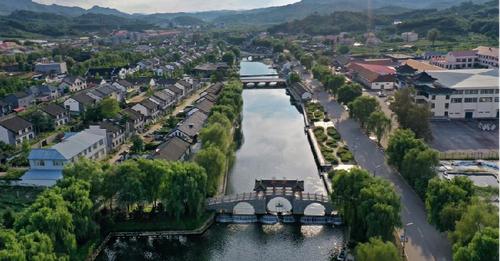
As pointed out by the resolution of the third plenary session of the Communist Party of China, integrated urban and rural development is essential to Chinese modernization. “We must promote equal exchanges and two-way flows of production factors between urban and rural areas, to narrow the disparities between the two and promote their shared prosperity and development.”
As a composite functional area composed of a high-density population core area and an ecological conservation area, a metropolitan area will have a polarizing effect that weakens the development opportunities of environmental conservation areas but will also promote the supply of ecological products. Thus, it is necessary to demonstrate the value of ecology and constantly narrow the gap with the development of central areas to make the city more coordinated and sustainable.
A RELIABLE ECOLOGICAL FOUNDATION IS ESSENTIAL
The ecological conservation area is an important boundary and offers great environmental functions. Taking Beijing as an example, the general city plan for 2016 to 2035 clarifies that the ecological conservation area is a crucial component of the northwestern ecological conservation zone within the coordinated development framework of the Beijing-Tianjin-Hebei region. It is a key area for ensuring the sustainable development of the capital.
Opinions on fully building a beautiful Beijing and accelerating the modernization of harmonious coexistence between humans and nature also note that by 2035, the ecological environment will see a fundamental improvement, carbon emissions will be significantly reduced, a new pattern of territorial development and protection will be fully established, and green, low-carbon production and lifestyles will become widely adopted and ingrained in society.
To achieve this goal, we must focus on systematic land-use planning, actively implement ecosystem protection and restoration projects, increase forest carbon storage and ecological carbon sink capacity, and enhance ecosystem diversity, stability, and sustainability.
CULTIVATING ‘ECOLOGICAL +’ BUSINESS WILL ENRICH EFFECTIVE SUPPLY
Relying on the rich resource elements of mountains, water, lakes, grass, sand, ice and snow, the ecological conservation area has great potential to develop the sports industry. Chinese President Xi Jinping has emphasized many times that “sport is an important way to improve people’s health and fulfill their aspirations for a better life.” In recent years, many local governments have built sports facilities to enrich new supplies and upgrade the sports industry with ecological theories. Just like the Miyun Ecological Marathon in Beijing, the first marathon event in China with the theme of “ecology,” attracted more than 12,000 participants worldwide annually, has not only spread environmental knowledge to the participants but also has gained great influence by holding such international events, as well as increasing the people’s passion for sports.
Ecological agricultural products are in high demand. Yunnan Province has the largest planting area and output of fresh cut flowers, rubber, coffee, walnuts and traditional Chinese medicine in China. Over 70 percent of Yunnan’s vegetables are sold to more than 150 cities across the country. Over the past two years, there has been a net increase of 96,000 agricultural business entities, bringing the total to 171,000 households.
Like Yunnan Province, many other Chinese provinces are trying to combine technology with agriculture, promoting the full life cycle management of green organic products to improve their added value.
The ecological healthcare and wellness industry is one of the most promising industries. For example, south China’s Hainan Province is trying to promote the deep integration of medical research and production, and has established a few regional medical centers and healthcare industrial parks. Situated in the breathtaking seashore area, these healthcare centers actively cooperate with internationally renowned research institutionsand tertiary hospitals, offering high-standard nursing care service systems. They have developed a batch of popular and characteristic healthcare and physiotherapy brands based on a pleasant ecological environment.
STRENGTHENING MULTI-DIMENSIONAL TRANSFORMATION IS A MORE ADVANCED PATH
An ecological area should turn a tourist destination into a place of spiritual nourishment, cultivating a long-lasting relationship with enthusiastic visitors. It is necessary to explore deeply the emerging “IPmodels,” such as how the popular Zibo barbecue uses “small skewers + small cakes + green onions” to “comfort the stomach and capture the heart,” therefore retaining people’s interest.
From the perspective of realizing the value of ecological products, it is necessary to strengthen supply in multiple dimensions, while observing the demand side and enhancing the adaptability of the supply structure to the changes in demand to achieve high-quality development.
Source: CGTN 16-Aug-2024. https://news.cgtn.com/…/How-China-bridges-urban…/p.html